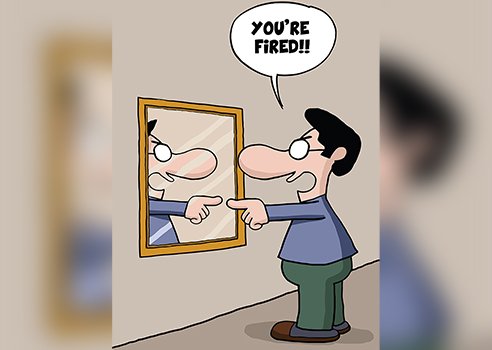Reading time: Less than 3 minutes
Have you ever thought of the value of self-talk? I’d always seen it as a liability but there are ways in which it can help you…
I adore open-area offices. When I started working in a newsroom 30 years ago — with a hundred reporters and editors, each with a phone and keyboard — I thought the noise and lack of privacy would drive me crazy. Instead, it invigorated me.
My desk was adjacent to reception so I had it noisier than most. But I quickly learned that if I moved my head down, towards my desk, and spoke really quietly, I could talk without being overheard. (This was important to me at the time because I had recently started dating Eric, the man who became my husband. You don’t want coworkers overhearing your sweet nothings!)
As well, I also quickly realized I could tune out any sound that wasn’t relevant to me and it became a vague background hum that made me feel like working. This feeling persists. I no longer work in a newsroom but I’m downtown one day a week for a client and because of a space shortage, I share an office.
My poor office mate, who is lovely, must get awfully tired of hearing me talk to my computer. I regularly say things like “don’t do that!” Or, “yes!” Or, “you’ve got to be kidding me.” Or, most commonly, “oh, crap.” (Out of respect for my colleague, I try not to let my language get any saltier than that.) Sometimes she even laughs at what I say and I enjoy the camaraderie.
But here’s the thing I realized recently. I’m not actually speaking to my office mate. And I’m certainly not speaking to my computer (that would be dumb. My computer at that office has no voice recognition program.) I’m speaking to myself.
In my Extreme Writing Makeover, lesson #26 is titled “How to stop the insanity of speaking to yourself.” (If you’ve ever been a student in the class you might want to re-read it now. Students get lifetime access to the files on my website.)
In the lesson I describe how most of the things writers say to themselves are woefully unhelpful. This includes comments like:
- My words are too dull.
- No one’s ever going to want to read this.
- I’m a crummy writer.
- My boss will hate this!
- I can’t handle this writing job.
But here’s a fact I hadn’t understood until recently. Research published in the Journal of Personality and Social Psychology found people who spoke to themselves as another person (in my case, by using the word “Daphne,” or “you”) perform better under stress than people who us the word “I.”
Luckily for me, I’ve been doing this all along. I’ve always enjoyed talking to myself this way, even when what I had to say was negative: “Don’t be such a dork, Daphne,” is one of my favourite self put-downs, mainly because of the alliteration, I think.
But when people talk to themselves this way, “it allows them to give themselves objective, helpful feedback,” says Ethan Kross, associate professor of psychology and director of the Self-Control and Emotion Laboratory at the University of Michigan.
In fact, Olympic athletes are taught to say such things as “Come on!” or “Let’s go” or “You can do this!” This is motivational self-talk and it really works according to researchers.
I learned all of this from a May 5/14 Wall Street Journal article. Sadly, I can’t provide you with the link because that will only take you to a page that demands payment. If you’re interested in reading the piece, I suggest you Google “Elizabeth Bernstein and self-talk” and then you’ll be taken to a no-charge version of the story.
The piece doesn’t mention writing, but here are seven phrases I suggest you try yourself:
- Writing can be hard sometimes, but you can do it!
- If you want a better story, [insert your name], you need better quotes
- Make sure you get some effective transitions in there [insert your name]
- Don’t focus on adjectives, [insert your name], concentrate on verbs
- You don’t have to win a Pulitzer Prize [insert your name], you just have to finish the story.
- Write first and edit later [insert your name]
- Good job, [insert your name]!
These are just suggestions. Why not see what encouragement you can offer yourself?
What’s some of the self-talk that you use, positive or negative? We can all help each other so please share your thoughts with my readers and me. If you comment on my blog by May 31, 2014 I’ll put your name in a draw for a copy of the intriguing non-fiction book Start with Why by Simon Sinek. If you don’t see the comments box, click here and then scroll to the end.


